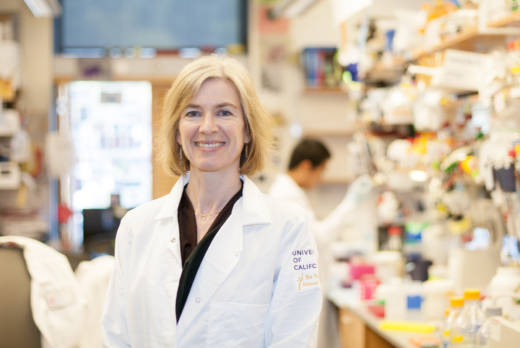But in her sweeping opinion, Judge Kimberly Moore wrote that “substantial evidence supports [PTAB’s] finding that there was not a reasonable expectation of success, and we affirm…. [PTAB] did not err in its analysis.” The decision, said Sherkow, “is absolutely 100 percent correct on the law,” leaving UC essentially no path to a re-hearing by the full court, let alone by the Supreme Court.
PTAB had ruled that Zhang’s success was by no means assured, citing Doudna’s own comments about how techniques that work in bacteria or test tubes often fail in higher-order cells, and that what Zhang did to turn CRISPR, a bacterial immune system, into a human-genome-editing tool was far from obvious. In an analysis that could well make scientists think twice about discussing the challenges of building on very basic discoveries, Moore cited Doudna’s acknowledgement of a “huge bottleneck” in modifying the genomes of humans and other animals, after Doudna and
Charpentier reported doing so in their test tube DNA in 2012. Doudna had also said that “2012 paper was a big success, but there was a problem. We weren’t sure if CRISPR/Cas9 would work in eukaryotes,” and conceded having “many frustrations” in getting CRISPR-Cas9 to work in human cells.” Those words came back to haunt her and sink UC’s hopes for a foundational CRISPR patent.
The central issue before the appeals court was whether the patent board had based its pro-Broad decision on “substantial evidence.” That, Sherkow tweeted,was “an extremely high bar.” The appeals court ruled that the board did have substantial evidence for its decision that the Broad’s CRISPR patents did not overlap with UC’s, nor were they obvious from UC’s. That leaves UC extremely little ground on which to base any appeal.
In a statement, the Broad called the court’s decision “correct,” upholding a PTAB ruling that “was clearly supported by sufficient evidence and followed applicable legal standards.’ As for what happens now, the Broad said, “It is time for all institutions to move beyond litigation. We should work together to ensure wide, open access to this transformative technology.”
The appeals court decision, in the case argued on April 30, clarifies the commercial landscape only partly, however. It allows the Broad to keep its patents, the first of which was awarded in 2014, on the foundational CRISPR-Cas9 genome editing technology for eukaryotic cells invented by Zhang. And it lets the Broad’s many licensees (notably Editas Medicine, which paid the Broad’s eight-figure legal costs) breathe easier. Since CRISPR Therapeutics licensed Charpentier’s invention (which is covered by the UC patent) and Intellia Therapeutics licensed Doudna’s, they now face a tougher but not impossible IP landscape.
Wall Street reacted calmly to the news, which analysts and investors had largely expected. Stocks of the major CRISPR companies were largely unchanged in midday trading, with Editas and Intellia slightly up and CRISPR Therapeutics down just under 3 percent. Gena Wang, a biotech analyst at Barclays, said any additional appeals by UC are unlikely to succeed, meaning the Broad should retain its U.S. patents. “We believe cross-licensing likely could occur and do not expect these proceedings to have direct impact on the clinical development of each company,” she said.
With additional reporting by Adam Feuerstein
This story has been updated with additional analysis and expert comment. It was originally published by STAT, an online publication of Boston Globe Media that covers health, medicine, and scientific discovery.
